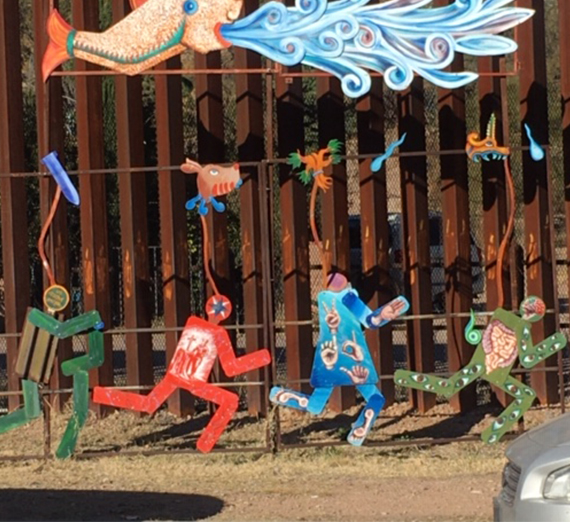The Humanity of Jesús

By Ellen Maccarone, Ph.D.
Associate Professor of Philosophy and Faculty Adviser to the President
I’ve been teaching, researching and writing about philosophy for 20 years. Spending seven short days at the border has changed me in a way that will most certainly impact the future of my academic work.
On January 3, 2020, I checked the Spokane weather report to determine whether I should park my car in the airport garage. I did not want to be shoveling out my car at the airport on my return from Mexico. Who would? A trip to Mexico in January conjures images of tropical-like vacations, but I had to dispel this idea among the many people I’d told of my Christmas break plans. I wasn’t going to a Mexican beach, I was spending a week at the border – the hotseat of humanitarian and political controversy.
I was a bit trepidatious about my week-long immersion as part of the Association of Jesuit Colleges and Universities leadership endeavor, the Ignatian Colleagues Program. But now that I have gone and come back, I wouldn’t trade it for anything. Because when I returned after one short week, I was a different person. The experience changed me in a much more profound way than any beach vacation ever could.
When I arrived in Tucson before heading south to Nogales with a group of other Jesuit college and university administrators, I knew that this trip would test me. We all knew we had to support to one another, because other interactions were going to be hard.
Saturday was our first day crossing into Mexico to meet with migrants at Kino Border Initiative (KBI) in Nogales, Sonora. KBI is sponsored in part by the Jesuit West Province, which also sponsors Gonzaga. The human interactions, the witnessing of pain and suffering that I had worried about, while often sad and hard, turned out to be the most rewarding part of my immersion. The people I met and the stories we shared were moments of great humanity in the face of terrible inhumanity.
I don’t speak Spanish. I had been practicing on Duolingo for six months, so I knew just enough to talk to the under-6 set, to frustrate the seven- to 12-year-olds and to need a translator for everyone else. Our group leader was constantly listening to hear anyone who might speak English who could talk with us, and he translated for the rest.
And that’s how I came to meet Jesús.* His is the story that touched me mostly deeply. He trusted me with his story and now I trust all of you. Jesús was waiting in the long line at KBI when our group leader heard him speaking English and found out that before he was deported, he had lived in Spokane. Yes, our Spokane.
Our group leader came to find me, urging me to go outside right then, and introduced me to Jesús.
Jesús and I talked all afternoon. He told me his heartbreaking story of living legally in Spokane (where his ex-wife and children still live), getting deported to Juárez, being kidnapped and forced to work for the cartel, disobeying them, enduring punishment and being left for dead in the desert, and finally making it to Nogales after weeks in the hospital to try to seek asylum and be re-united with his children.
Jesús said he felt his “humanity slipping away” as he was being forced to work for the cartel, task after terrible task. Then he met meet a 7-year-old girl who the cartel would rather have had dead, and he drove her and her mother to safety rather than let them be killed. When I commented that he saved their lives, he told me that the girl had saved his, because she had reawakened in him his own humanity.
I saw Jesús again just one more time at KBI. Through knowing him and his trusting me with his story, I felt my ability to be empathetic and compassionate expand. My humanity is now bound up in his even if I never see him again. I feel his prayers for me as I hope he does of mine for him.
* His name has been changed to protect his identity.
